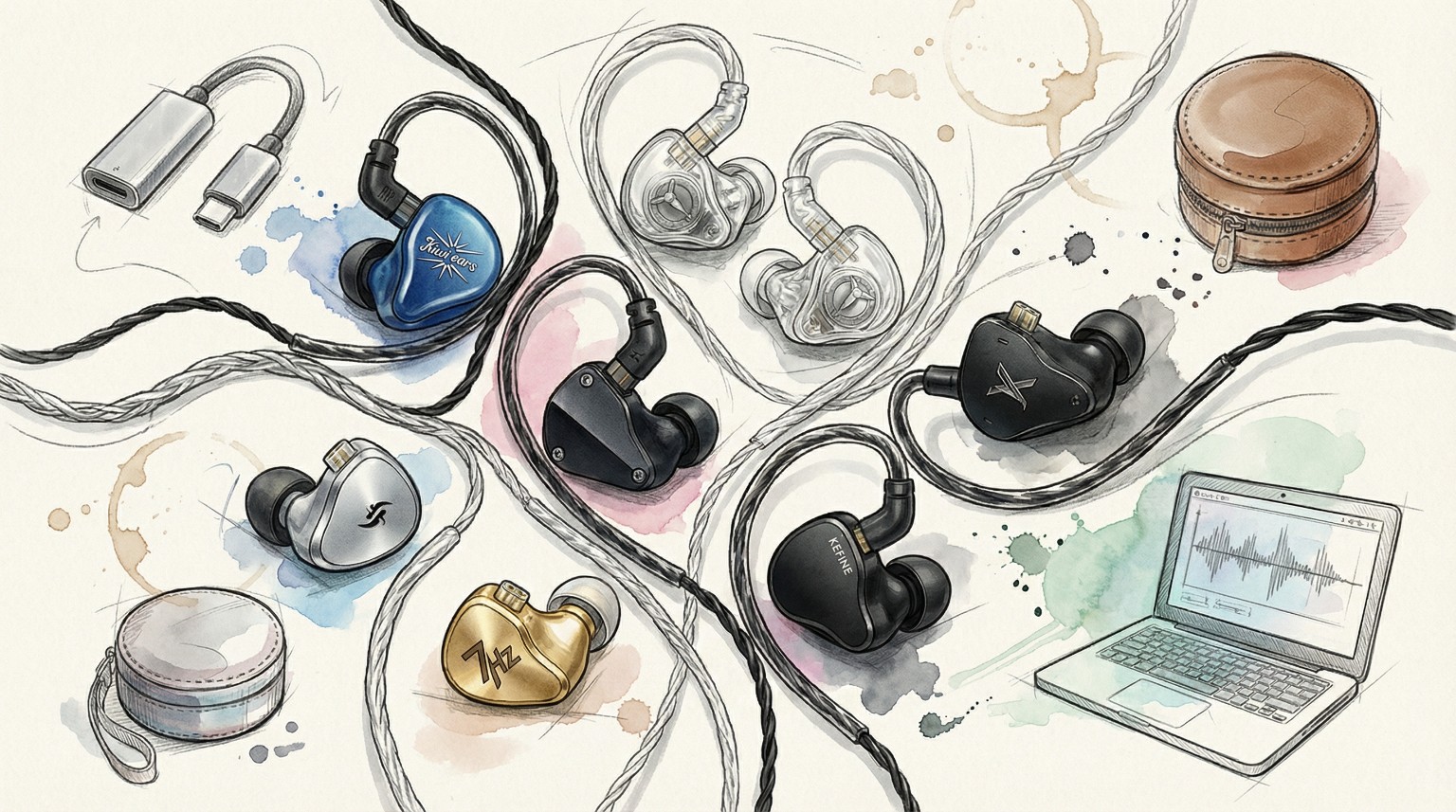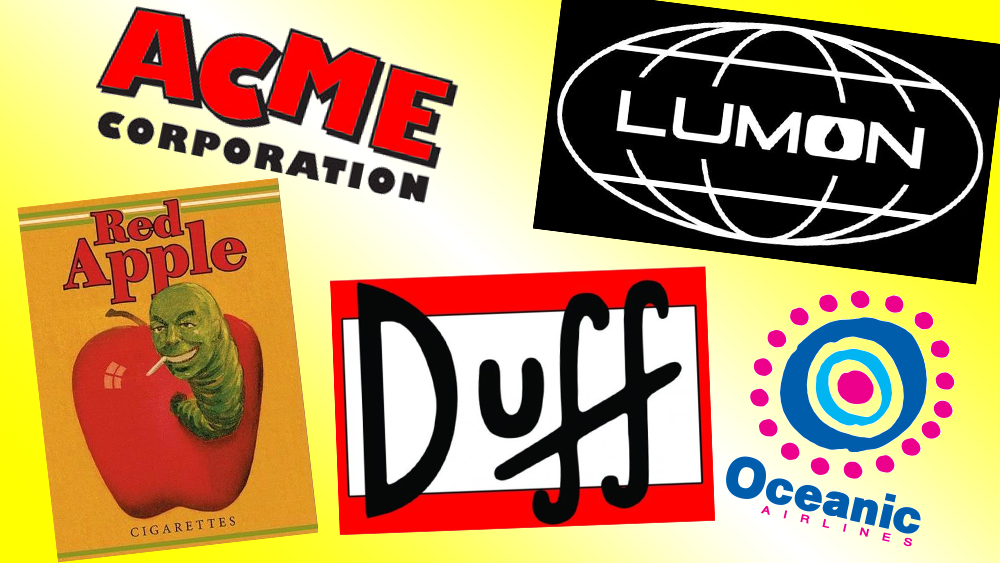
Sign up to Creative Bloq's daily newsletter, which brings you the latest news and inspiration from the worlds of art, design and technology.
You are now subscribed
Your newsletter sign-up was successful
Want to add more newsletters?
The best fictional brands can be humorous and ironic, but some feel like they could be real. Sometimes they have such strong identities, from their logo design to packaging design, that they do actually cross the line from film and TV to the real world, and that makes them interesting to study for creatives looking for branding inspiration (also see our pick of the best TV show logos).
Many Fictional brands are created to avoid legal issues with real brands (or to avoid free product placement), but some of them also perform story telling rolls or go on to become a recurring element, adding to the authenticity of on-screen universes. Below is our entirely subjective pick of some of the best examples of fictional brands from film and TV, in no particular order.
The best fictional brands in film and TV
01. Red Apple Cigarettes (Quentin Tarantino)
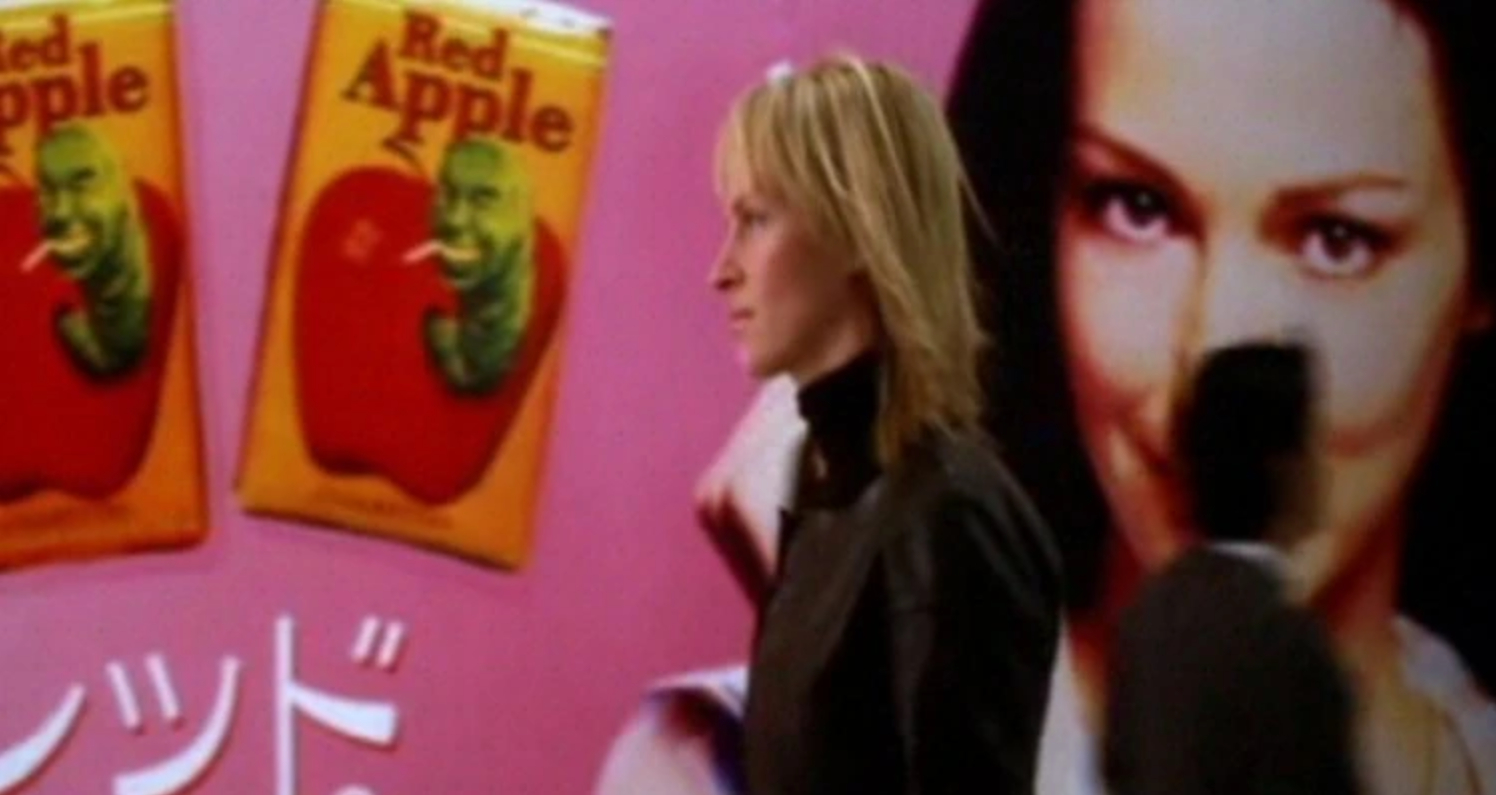
Quentin Tarantino loves self-reference as well as referring to myriad other films from cinema history. Red Apple is a very unlikely tobacco brand, both for its name and packaging design: a tobacco yellow with an illustration of a green worm with a man's face, crawling out of a large red apple, but they have become a regular feature of the Tarantino universe, and an amusing send up of big tobacco branding. The brand crosses the two levels of Tarantino's fictional world: the 'real world' and the world of the fictional movies that appear within it.
02. Chumhum (The Good Wife/The Good Fight)

If you haven’t watched The Good Wife and its follow-up, The Good Fight, then where have you been? The legal/political TV drama set in Chicago is smart, witty, and likely to be remembered as one of the most iconic shows of the 2010s.
That’s partly because it hoovers up both current events and the online zeitgeist and reinvents them as captivating storylines. And whatever labyrinthine plot is unearthed in any particular episode, its nexus can often be found in a barely disguised equivalent of Google, called Chumhum.
The reason Chumhum works so well as a fictional brand is that, unlike on other shows, these writers actually understand the intricate workings of the online economy, from Bitcoin to fake news.
Parody only ever works well if it comes from a place of respect for the subject matter. And from its MailChimp-style mascot (‘Chummie the gopher’) to its simplified colour palette, to the multiple brand offshoots (such as the allegorithmically discriminatory Chumhum Maps), this fictional brand nails the look and feel of a modern web giant perfectly.
Sign up to Creative Bloq's daily newsletter, which brings you the latest news and inspiration from the worlds of art, design and technology.
Recently, Chumhum has even started popping up in other CBS shows, such as the US reboot of Israeli crime drama Wisdom of the Crowd. Not surprising then that real-life versions of the Chumhum search portal are now appearing online everywhere, from the UK to China.
03. Pizza Planet (Toy Story)
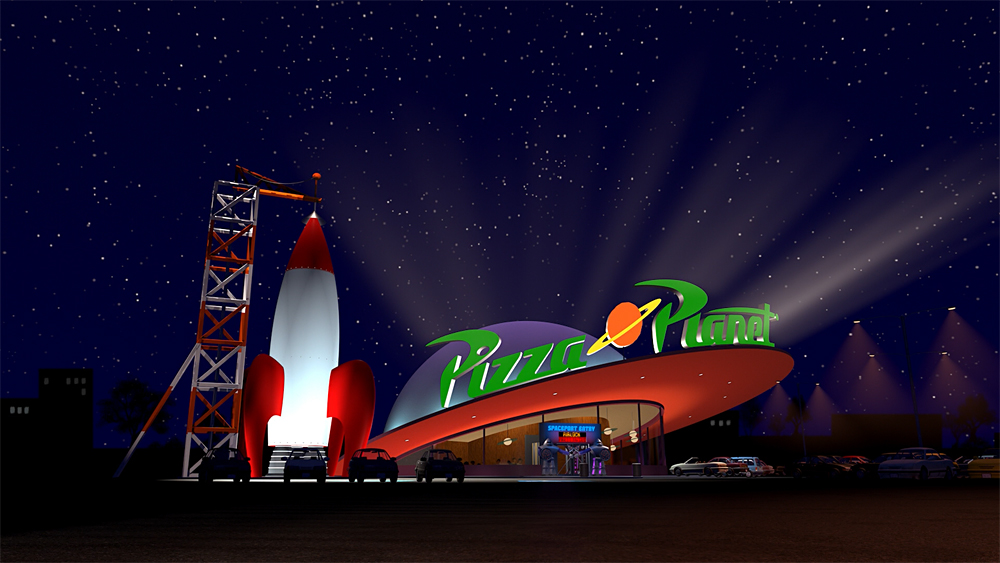
Kids love pizza, and kids love aliens, so what child wouldn’t want to go to Pizza Planet? Especially when the fictional fast-food chain, which appears in Toy Story and Toy Story 3, offers cool attractions like Alien Slime dispensers, a Whack-a-Alien game, and a ‘Claw’ challenge where you can win the most loveable alien toys ever. (Not to mention robot bouncers at the entrance that look suspiciously like the Cylons from Battlestar Galactica.)
The design of the restaurant building itself is both beautifully minimalist and gloriously epic. Shaped like the planet Saturn, and crowned with a retro-cursive ‘Pizza Planet’ logo, it combines the best of 1950s Americana with futuristic optimism, plus the rocket launchpad at its side is truly Las Vegas-grandiose.
The brand also seems infinitely extensible, appearing on everything from the Pizza Planet-branded season schedule on Andy’s wall to the Pizza Planet truck, which has made cameo appearances in every Pixar film to date besides The Incredibles. Strange to consider, then, that in earlier versions of the Toy Story script, Pizza Planet was actually going to be a miniature golf course called Pizza Putt.
Pizza Planet fans will also be pleased to know that a real-life version of the restaurant is reportedly coming soon to Disneyland in California.
05. Lumon Industries
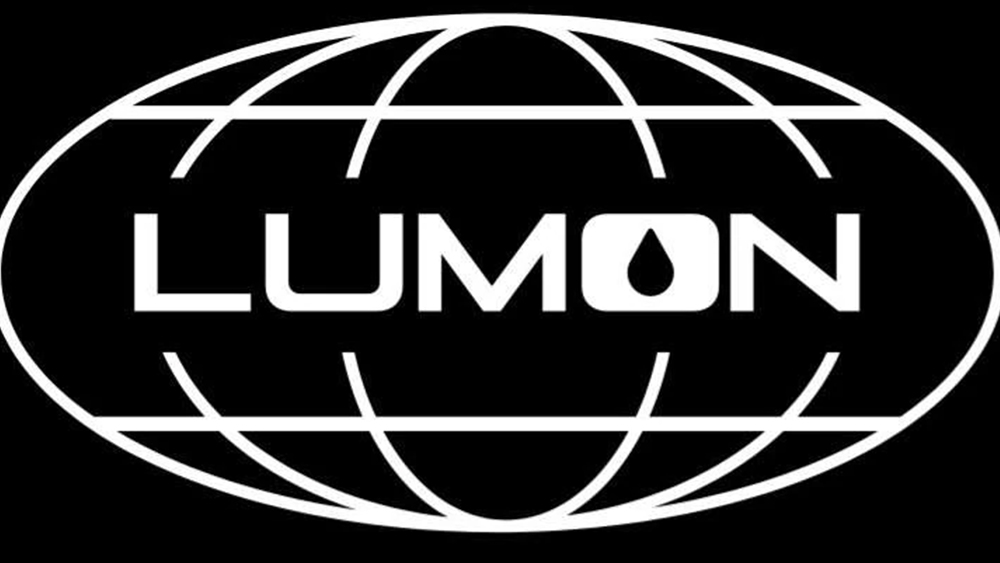
We're currently looking forward to Severance season 2, in which we hope to learn more about the mysterious and powerful biotech company Lumon Industries. In this hit Apple TV series, the fictional brand is much more than a minor detail: it's behind the whole premise of the story, and it's the location for much of the action.
As such, it's one of the most developed fictional brands on our list. As the series progresses, a backstory and brand philosophy starts to emerge. We even see a believable development of the company's branding, from its humble beginnings as a maker of topical salves with an elaborate logo featuring a flask, spoon and drop of fluid.
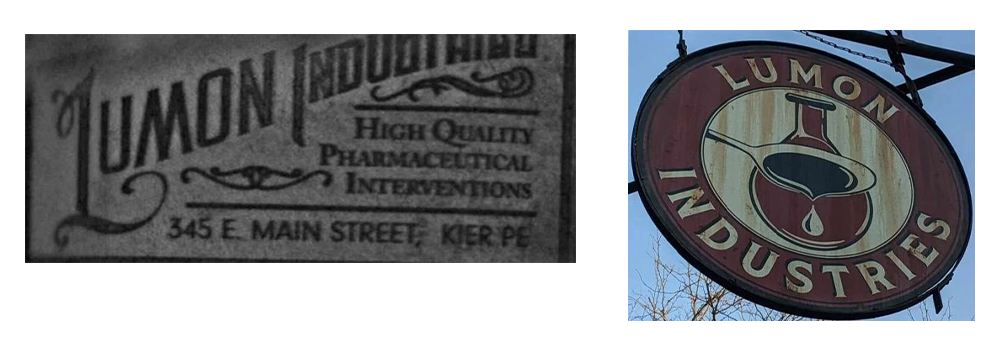
Part of the success of the series is how frighteningly real Lumon feels, right down to the evolution of the branding. In line with real-world trends, the logo design at the time the series is set has been vastly simplified but still sports that droplet in the 'O' as a nod to its heritage. It almost seems like inspiration could have been taken from Apple itself. It's the only fictional brand I'm aware of that has a LinkedIn page.
05. Acme (Roadrunner)
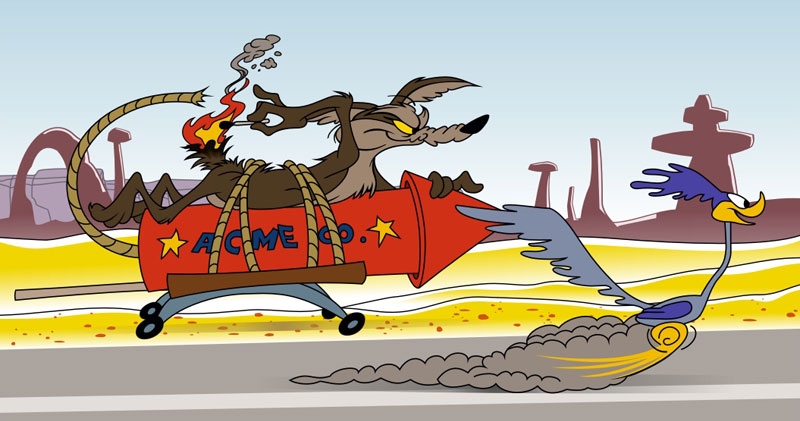
One of the reasons that the Roadrunner cartoons, most of which were made between 1949 and 1966, still resonate today is the simplicity of the concept. In every single episode, Wile E. Coyote hunts a roadrunner using absurd contraptions that consistently fail or backfire catastrophically including anvils, fold-out roadblocks and stick-on tunnel entrances.
The viewer is always alive to the gag, because all these products are made by the same failing company, ironically called Acme (which means perfection in Greek). Surprisingly, though, there were actually many real-life ‘Acme’ companies throughout the 20th century, because the name meant they would appear at the top of alphabetical telephone directory listings.
As far as we know, none of these got upset by the defamation created by the Roadrunner cartoons, and nor does it seem to bother the many companies with Acme in their name today, such as Acme Markets, a division of Albertsons. Perhaps a sign that as an element of the branding mix, strong name recognition counts for more than anything else?
06. Oceanic Airlines (Lost)

Anyone who got hooked on Lost around a decade ago (and who didn’t?) will be familiar with Oceanic Airlines. The company was central to the twisty-turny plot of the hit drama, in which Oceanic Flight 815 crash-lands on a mysterious island, stranding its passengers.
And as viewers struggled to guess what exactly was going on, the branding of the airline itself became the subject of frenzied debate. The colourful, stylised logo depicting an Australian Aboriginal dot painting was wildly speculated about by fans, who saw it as symbolising such things as a nazar, a bullseye, or the island itself.
Meanwhile, back in the real-world, the fictional branding played a large part in ABC’s real-world marketing, with fake billboards for Oceanic placed in cities around the world as part of the Find 815 alternate reality game. Fictitious TV ads for the airline also aired on ABC and on the web, including one made in an alternate universe where flight 815 did not crash and Oceanic has a "perfect safety record" (see below).
The appearances in Lost were only the latest in a long-running screen-life for the Oceanic Airlines brand. The name has been used in multiple films and TV shows since the 1960s, including Alias, Castle, Chuck, Flash Forward, Diagnosis Murder, Fringe, Futurama, The Goldbergs, Once Upon a Time, The X-Files and Grey’s Anatomy, and most prominently in the 1996 film Executive Decision. The logo above was created specifically for Lost.
07. Stark Industries (Iron Man)

Stark Industries first appeared in April 1963, in the Marvel comic Tales of Suspense #40. Owned and run by businessman Anthony Edward ‘Tony’ Stark, aka Iron Man, it’s been a central plot device in its comics, TV shows and movies ever since.
Nowadays, Stark Industries represents the world’s largest tech conglomerate within the Marvel universe, although according to a tongue-in-cheek analysis by Forbes, it had a lower net revenue in 2007 than Wayne Enterprises in the DC Universe (which made $31.3 billion, in comparison to Stark Industries $20.3 billion, in case you were wondering).
With bases in New York and Los Angeles, Stark Industries also benefits from superlative branding, with a heavy-set, bold-italic logo that combines a vintage feel with a forward-thrusting sense of progress. It’s all very reminiscent of real-world corporate behemoths such as Lockheed Martin, and perfectly conveys the confidence and cocky vision of its fictional owner.
Featured in more than 10 movies to date, this cool and distinctive branding appears on everything from airplanes to factories, and of course, the iconic Stark Tower. Given Marvel’s cinematic productivity of late, expect to see it in at least a dozen more films and TV shows before the decade is out.
08. Cheesy Poofs (South Park)
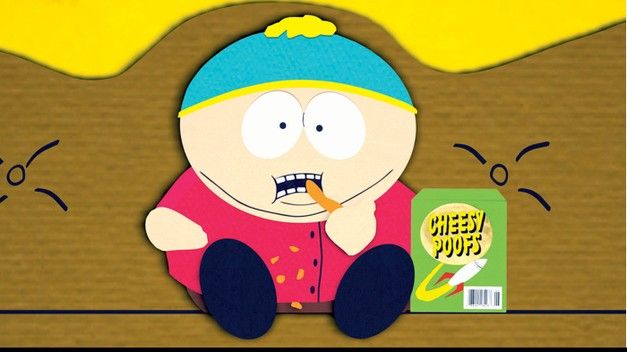
What South Park fan hasn’t at one time found themselves craving a packet of Cheesy Poofs (or 10)? For the uninitiated, this is the fictional brand of cheese-flavoured snack beloved by the adult cartoon’s anti-hero, the gluttonous misanthrope Eric Cartman. And its brightly coloured, upbeat packaging style perfectly parodies the way food companies entice children to eat unhealthy snacks. It can also lay claim to one of history’s most memorable jingles (“I love cheesy poofs/You love cheesy poofs/If we didn't eat cheesy poofs/We'd be lame”).
In fact, South Park’s animators did such a good job that the show’s maker Comedy Central has actually released real-life Cheesy Poofs as limited editions on two occasions. The first they sold via their website in 1998, then in 2011 they teamed up with Frito-Lay to repackage real-life brand Cheetos Puffs under the name at Wal-Mart stores.
09. Stay Puft Marshmallows (Ghostbusters)
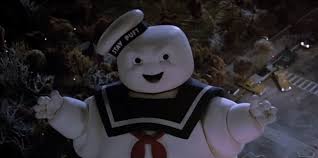
The makers of iconic 1984 comedy Ghostbusters weren’t satisfied with creating iconic branding for the film itself (one of our five favourite fantasy logos). They also created one of the most memorable in-movie brands of modern cinematic history, in the form of Stay Puft Marshmallows.
This fictional brand’s memorable 1950s-retro mascot, a boyish figure made of conjoined marshmallows in a sailor’s uniform, combines the best qualities of the Michelin Man and the Pillsbury Doughboy. And so even when, at the end of the film, he comes to giant life and destroys most of Manhattan, he remains a fun and friendly figure that any child would be drawn to, the gleeful grin on his face perfectly evoking the joy of an indulgent sugar rush.
It’s not surprising, then, that not only has the Stay Puft Marshmallows brand appeared in numerous Ghostbusters sequels and spin-offs, but in 2010 and 2012, real-life Stay Puft marshmallows were released as official movie merchandise.
10. Duff Beer (The Simpsons)
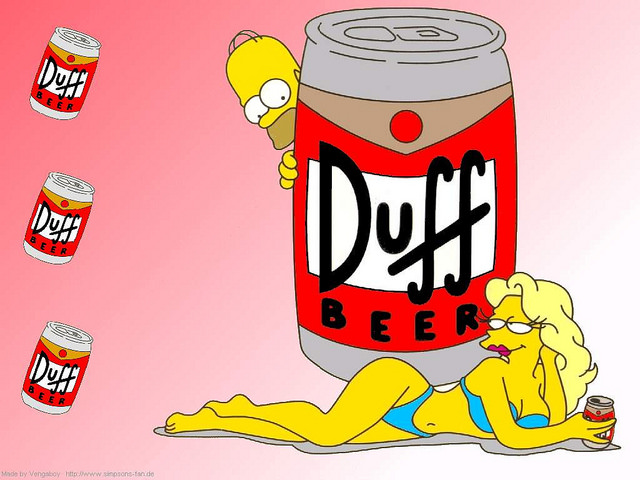
Even if you’ve never watched The Simpsons, you can probably guess from the name that Duff Beer is a satire on the kind of mass-market beverages popular with working-class Americans.
But it seems that irony sells, because companies around the world have attempted to sell their own beers under the Duff branding (a practice known as 'brandjacking'), resulting in numerous legal battles.
Finally, in 2015, Simpsons producer 21st Century Fox relented and began selling its own licensed Duff beer in Chile. A version of the beer is also sold at Universal Studios.
To an extent, Fox has only got themselves to blame, because the fictional brand of Duff is relentlessly and superbly marketed within the show, from its spokesperson Duffman (a parody of Budweiser's '70s-era mascot Bud Man) to the Duff Gardens theme park ride through a brown river of beer ("Duff beer for me, Duff beer for you, I'll have a Duff, You have one too") and the ever-present Duff beer blimp.
Is it any wonder we’re all craving Duff? Sorry Family Guy, but Pawtucket Patriot Ale just doesn’t get a look in.
11. Wonka Bars (Charlie and the Chocolate Factory)
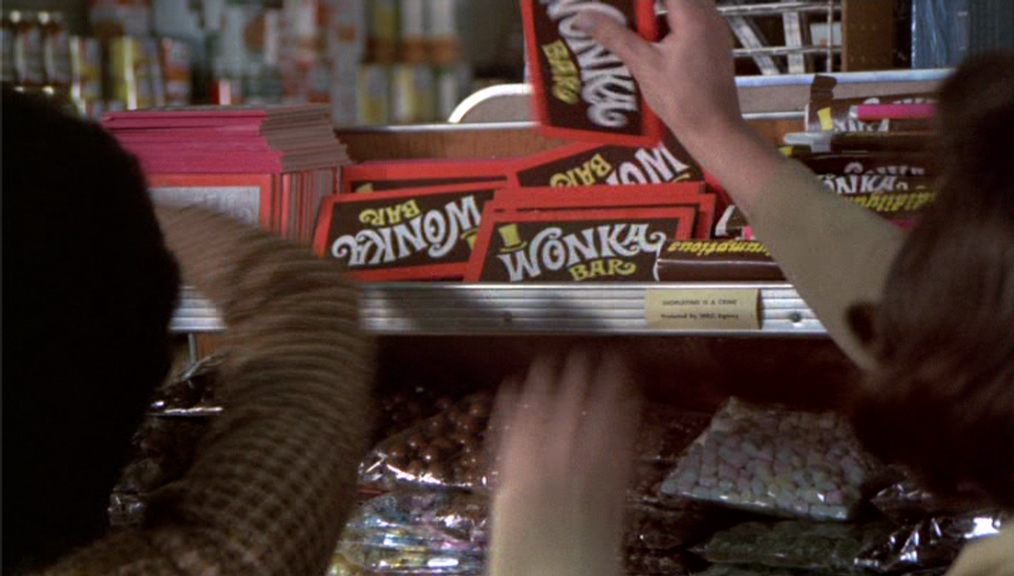
Whether you discovered Roald Dahl’s classic children’s story Charlie and the Chocolate Factory through the original book, the 1971 movie, its 2005 remake, or the 2013 West End musical, generations of kids have been drawn to the magical lure of Willy Wonka’s magical candies. And in this case, not just in the imaginary world but the real one as well.
The first company to license the brand for real chocolate was Quaker Oats, which financed the 1971 film and released its own Wonka candy bars in the same year, although they unfortunately had to be recalled from stores due to production problems. A subsidiary called Breaker Confections later developed the brand, releasing a variety of Wonka products through the 1970s. This company was later acquired by Nestle, who continue to produce Wonka branded goods for local markets around the world to this day.
Although real-world Wonka products do not have the magical properties of their fictional counterparts, they do take inspiration from them. Nestle’s everlasting gobstopper, for example, is composed of several discrete layers, which allow for the colour- and flavour-changing effects described in the book. In a triumph of branding over the Trades Description Act, however, they are not actually everlasting.
12. Bubba Gump Shrimp Company (Forrest Gump)
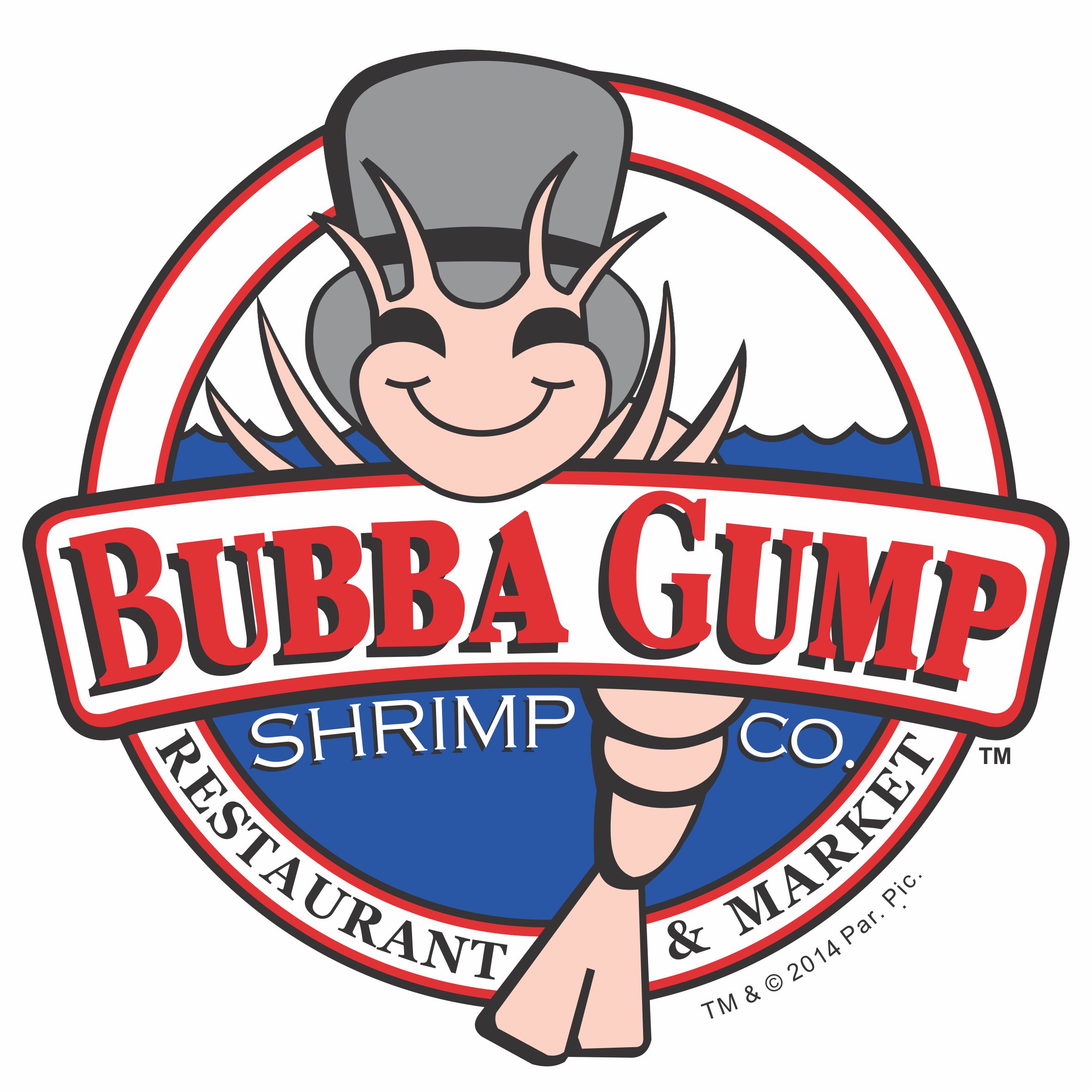
The Bubba Gump Shrimp Company has to finish our list because it’s arguably become even better known as a real-world brand than a fictional one.
Featured in the 1994 film Forrest Gump, the fictional seafood restaurant inspired a real-life chain which had 40 branches by 2015, in the United States, Mexico, Japan, Malaysia, London, Hong Kong, Indonesia, the Marianas and the Philippines, generating around $400 million per year in revenue. The company is based in Houston, Texas, and has been a division of Landry's Restaurants since 2010.
As in the film, Bubba Gump Shrimp Co.'s menu consists mostly of seafood dishes inspired by Southern and Cajun cuisine. Movie memorabilia is on display throughout the restaurant, and customers are given a “Stop, Forrest, Stop” sign to catch the waiter’s attention.
Why has this fictional restaurant brand been so successful, when the world is still bereft of a Jack Rabbit Slims (Pulp Fiction), Stan Mikita's Donuts (Wayne’s World) or Mos Eisley Cantina (Star Wars)? There are many factors but perhaps most important is that, rather than just appearing as a movie backdrop, the restaurant chain plays an important role in the plot.
In the film (spoiler alert!), Forrest’s Vietnam War buddie Bubba suggests getting in the shrimping business and, ultimately, Forrest pursues this idea after Bubba's death. In this modern era where brand storytelling is crucial to the marketing mix of restaurants, it seems that even a fictional back story can help make the difference between success and failure.
For real branding inspiration, see our pick of the best logos of all time.

Tom May is an award-winning journalist specialising in art, design, photography and technology. His latest book, The 50 Greatest Designers (Arcturus Publishing), was published this June. He's also author of Great TED Talks: Creativity (Pavilion Books). Tom was previously editor of Professional Photography magazine, associate editor at Creative Bloq, and deputy editor at net magazine.
- Joe FoleyFreelance journalist and editor
